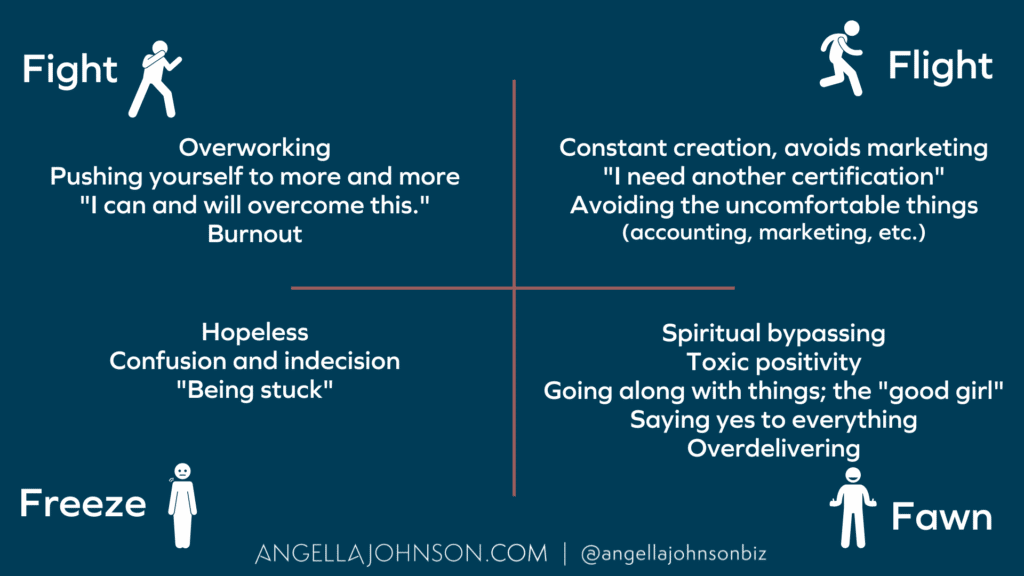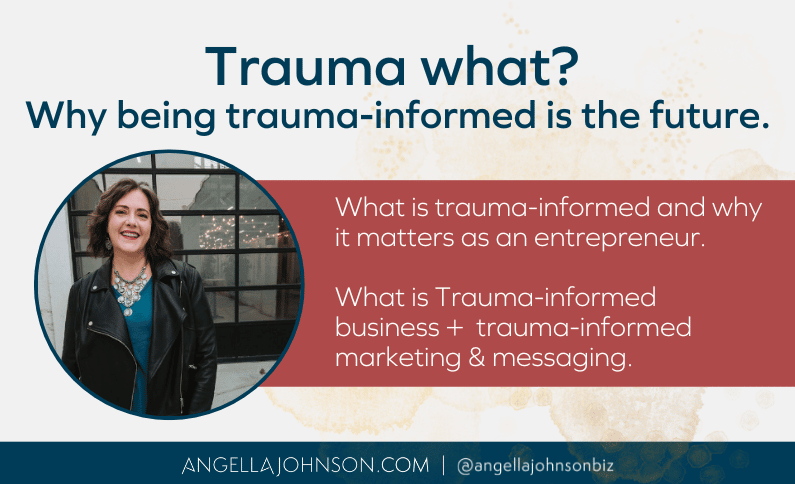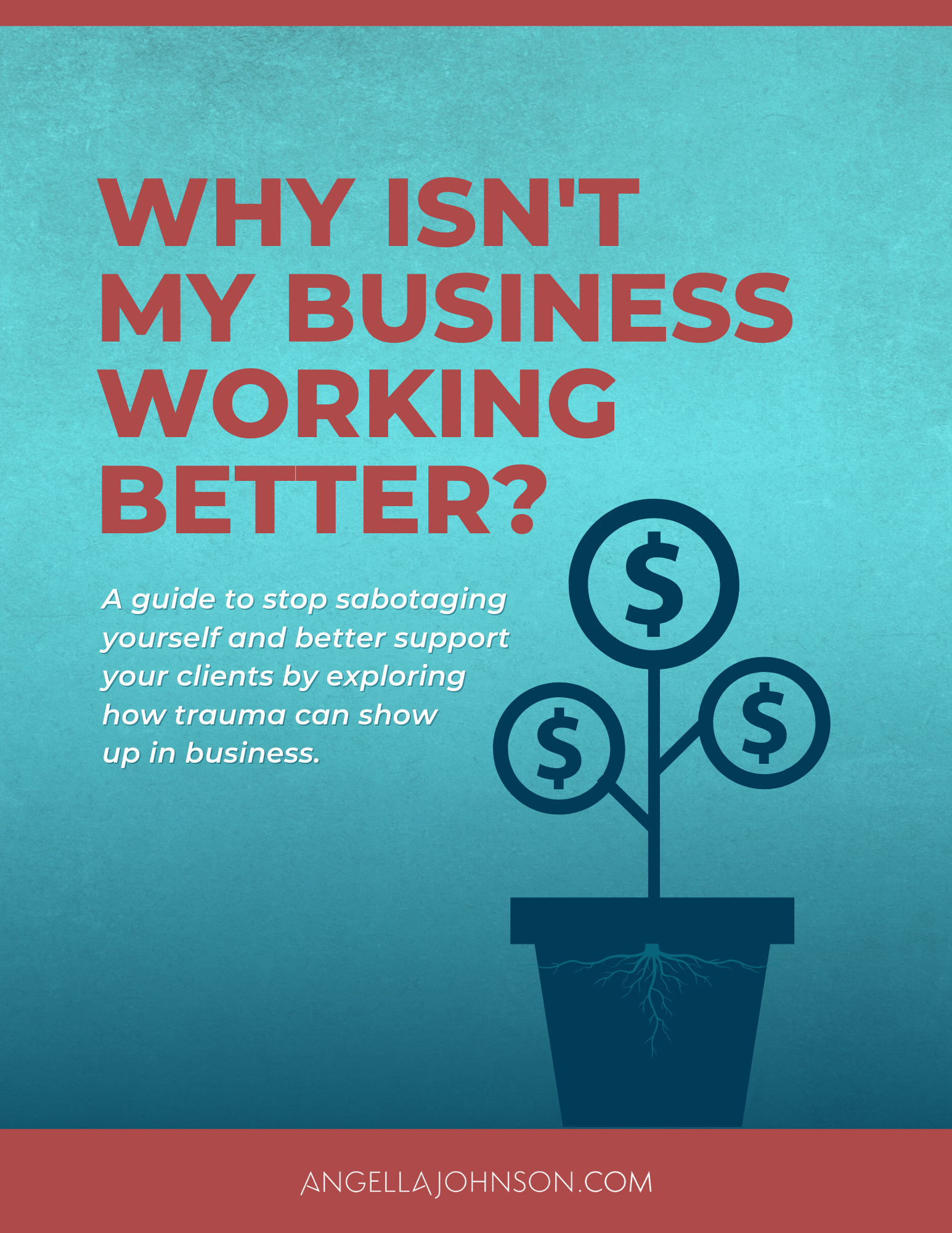Trauma – a Taboo Topic that Needs to Be Talked About
The word trauma repels a lot of people. Usually, there are three common responses to the word:
- The very word is taboo so it’s not only avoided but it’s vastly misunderstood and misidentified.
- “Hmmm, I’m curious.” And that’s often accompanied by skepticism or nervousness (rightfully so because again, trauma is so misunderstood)
- “Yes! Finally, someone else is talking about this.” (Folks in this last category usually start talking about all of the “light” reading and study they’re doing about trauma.)
Important to Note:
I want to be clear about my scope of practice. I’m a trauma-informed business coach, strategist, and communications expert. I’m also a grad student who has been doing research on how trauma impacts business owners and a lot of the info I’m sharing with you here is from that research and study. I’m not a trauma-trained/trauma-resourced mental health practitioner or a trauma educator, which means it’s not in my scope of practice to help an individual process trauma. I share more about what being a trauma-informed coach means below.
Why Trauma? My journey with studying trauma.
Mental Health
In 2020 as the Covid pandemic hit, I didn’t take it well. My mental health struggled and I knew I needed different support so I started seeing a therapist. During that time, I noticed that unhelpful patterns in my life that I had tried to change for decades, were getting more prominent and loud.
During therapy and much to my surprise, I started understanding that I had trauma and it was being exacerbated by the pandemic.
Wait, what? Trauma? Me? I thought trauma was only for people who lived through catastrophic things like assault, war, a natural disaster, physical abuse, etc.
The truth is I had no idea what trauma really was. I had no idea how my nervous system worked or how experiences that weren’t “that bad” were actually trauma and were very much affecting my ability to thrive in my life.
I quickly came to understand that trauma was at the root of difficult recurring patterns in my life that despite decades of mindset and self-help, healing modalities, and working hard, those patterns weren’t changing.
For years, I told myself that I was broken and needed to work on my mindset. I would then alternate beating myself up for my lousy mindset with periods of pushing myself to the point of burnout. It was a constant tug-of-war to figure out “what was wrong with me” and why I kept sabotaging myself.
My Healing Began
One therapist I worked with did IFS (Internal Family Systems) and EMDR (Eye Movement Desensitization and Reprocessing) with me and that’s when it all started clicking. Patterns started changing. I started paying attention to what beliefs and patterns I held in my body and just not intellectualizing everything.
*Just because I mention modalities or people I’ve learned from does not mean I’m actively recommending people, their work, or modalities for you to try. Always do your due diligence and the very nature of trauma is that we all process things differently. What works for one person may not work for another. This is not a one-size-fits-all approach to awareness or healing.
Through this ongoing healing I’ve done since 2020, I realized three key things:
- I spent decades *gaslighting myself into thinking that I was “fine.”
- I spent decades using *toxic positivity and *spiritual bypassing as another way to invalidate my experiences and bury my feelings.
- I have yet to meet a person who hasn’t experienced trauma, yet hardly anyone was talking about it.
*If you don’t know what these words mean, I’ll define them in the next section.
Through my own healing, I started to see how trauma is linked to everything. Once I saw it, I couldn’t unsee it.
There is a lot of skepticism about people saying that any negative experience is “trauma,” and that people just need to suck it up and move on. I’ll address that in the next section, too.
The Research & Going Back to College at Age 45
In 2022, I did a wild thing and went to get my Master’s degree at the young age of 45.
I had the opportunity to do qualitative research for my Master’s project and I proposed a study on how trauma impacts business owners. My research proposal was accepted and in April 2022 I did my first round of interviews. I continued the research for 10 months and did two rounds of interviews total with two different groups of people. (I’m continuing this research in 2023.)
The Interviews
The first round of interviews was with business owners who have been in business for at least three years and self-identify as having experienced trauma. What emerged from those interviews validated my theories of what I’ve seen in not only myself, but with colleagues, and the hundreds of clients and students I’ve worked with since 2008 in my events, courses, and coaching programs.
In a nutshell, what the research pointed to was that people sabotage themselves and struggle with “the fear of failure” and “fear of success” not because of their mindset, but because of trauma.
Are we doing things in our business out of fight, flight, freeze, or fawn trauma response?
This topic came up repeatedly in my research and the majority of experts I interviewed also pointed out that oftentimes, entrepreneurs start their business out of a trauma response. Something to consider is that this is not a bad thing, it’s simply something to notice and to pay attention to if you’re in a constant trauma response vs making conscious decisions from a place of safety within your nervous system.
A common example that came up in the interviews was the pattern of not following through on the big idea you have. People tell themselves it’s because they are lazy or unmotivated when actually, it’s their nervous system in a freeze response.
Is the lack of follow-through ALWAYS related to a trauma response? We cannot pathologize (diagnose) that for anyone. The key here is looking at your habits through a different lens other than self-judgment.
Another common example was a person pushing themselves no matter the cost to prove that they can create success. One participant said that she could just “take it” and she couldn’t slow herself down when it came to working so hard. Some call this over-diligence and perfectionism, a fight response.
Again, these are ideas and possibilities to consider vs assigning trauma to you or someone else as the reason a certain behavior is happening.
Since I’m not a mental health professional or trauma expert, my second round of interviews was with trauma-trained therapists and trauma experts to gather data from that angle. So far, the expert interviews have 100% validated everything I gathered from the first round of interviews and added additional context of just how prevalent trauma is in people and how it affects their business.
Qualitative Interviews (and Biased Studies)
When people think of qualitative research, they may think of people like Brene Brown who interviews hundreds of participants. While I wish I had that size of team and budget, I was surprised to learn that qualitative research doesn’t necessarily need hundreds of participants in order to be valid data.
When doing qualitative research, you interview people until you reach what’s called “saturation,” which is when you don’t see any new themes coming up. This typically happens with 10-25 interviews. In my opinion, this is also why it’s crucial to get a diverse sample for your study.
It’s been disheartening and enraging to see how a lot of research, especially from the 80s and 90s, is conducted by White dudes and the diversity of their sample size is unknown but it’s fair to assume that it centers a lot of White people. And these are the theories that we are basing today’s research on. I’m glad to see that this is changing, but not nearly fast enough. Seeking a diverse sampling for my interviews was and continues to be a key focus.
For my study, I interviewed 14 entrepreneurs in round one and interviewed five trauma-trained experts in my second round of interviews.
The details of the sample pool, along with my research findings, are included in the ebook I’m creating to share my findings, which you can get when it’s available at the end of this post.
Alongside the research I’ve been doing, I’ve been studying with additional trauma-trained experts and programs over the past couple of years and the learning in those programs is supporting the data I’ve gathered and adding important context and nuance to better understand what trauma is and more importantly, what the hell do we do about it?
Bottom line: I don’t claim to be a trauma expert or mental health professional. What I’m trained in and naturally gifted in is asking questions, deeply listening, seeing the patterns, validating those patterns through other studies and expert interviews, then communicating things in a way that people can gain insightful information that they can then use to change their life. Professionally speaking, my expertise is in marketing, messaging, coaching, and facilitation.
Helpful Terms
Sources and teachers who have influenced my work:
Chantel Chapman, co-founder of Trauma of Money
Katie Kurtz, the creator of Cultivate, a trauma-informed training
Melissa Lapides, founder of Safe Space Institute
Trudi Lebron, founder of the Institute for Equity-Centered Coaching
Shelby Leigh, Embodied Trauma Leadership
*Always do your own due diligence with teachers that you learn from and classes and programs that you are considering taking.
Trauma:
Katie Kurtz, defines trauma like this in her Aware guide:
“Trauma is a non-binary, human response to an event(s) or experience(s) that disrupts, threatens, or harms the safety, security, and stability of an individual, group, collective, and/or culture.
It can occur acutely (one time), chronically (complex), systemically, historically, ancestrally, and/or vicariously. It’s important to understand that trauma is NOT the event(s) but rather the human response to that event(s).”
Another way to say this is when you have such an experience, your perspective and reactions to things are altered because of that nervous system response your body has had from the experience.
The difference between trauma and a negative experience is trauma alters your physiology and when your physiology is altered, your perspectives moving forward are different. You now adjust your life to that perspective based on that experience.
The good news is, you can heal trauma and your nervous system. The perspectives and life adjustments that you make when you experience trauma don’t have to remain permanent. The healing process for each person is different.
Lastly, trauma is NOT the event itself, but how your body responds to the event.
==> This is why comparing trauma is harmful – no one can say whose trauma is worse. Every individual is different.
Trauma Responses:
 People often mention fight or flight as a trauma response, however, that’s just two of the four. There is a fight, flight, fawn, or freeze trauma response.
People often mention fight or flight as a trauma response, however, that’s just two of the four. There is a fight, flight, fawn, or freeze trauma response.
The Fight response can look like actually fighting, or being argumentative. It can also include things like aggression, irritability, frustration, always having something to prove, being reactionary, and being defensive.
The Flight response is a way that you flee the situation. This could look like changing the subject, avoiding the situation, anxiety, fear, panic, chronic worry, and perfectionism.
The Freeze response is feeling frozen, unable to respond, feeling stuck, inability to make a decision, disassociation, spacing out, overwhelm, and depression.
The Fawn response is being agreeable, avoiding conflict, people-pleasing, having difficulty with saying no and setting boundaries, and going with the flow instead of saying what you want (“Everything is fine.”)
The thing to remember with any of these responses is there can be crossover and more importantly, these are automatic responses and your nervous system is doing its job of keeping you safe. These behaviors can be challenging and this is why healing our nervous system and being aware of how our nervous system works is critical.
Trauma-Informed:
As one of my expert interviews said, the very language of “trauma-informed” is problematic because you can be informed that trauma exists but you need to do more than just be informed about it. What you DO about it and how you account for it in your work is what makes you trauma-informed.
I love this definition from Katie Kurtz: “Being trauma-informed is having the knowledge and understanding of trauma and developed skills (attained by some form of qualified training) actively applied across a scope of practice. It does not include the ability to address or respond to/through other people’s trauma.”
Being trauma-informed does not mean you can or should help people process their trauma. Helping people process their trauma is really meant for people who are professionally trained and licensed to do so. People who are equipped to process a person’s trauma with them can sometimes be referred to as trauma-resourced (Katie Kurtz) or trauma-trained.
In the self-help world, we see a lot of unqualified people digging into people’s trauma as a way to help them understand their mindset, but in many cases, they are creating more harm and doing so to boost their own ego. Shoutout to Melissa Lapides for this recent conversation in her trauma-coaching program I’m currently a part of.
The challenge with the term trauma-informed is that people are not using it in the same way. It can mean completely different things depending on who is using it.
Helpful tip: When you see someone using any of these terms, ask them what they mean by that if they haven’t clearly communicated it. If you are using the term trauma-aware, trauma-informed, etc. then be clear about what that means.
Trauma-Informed Business
Being a trauma-informed coach, practitioner, or business owner means that you understand there are many things happening within a person that affects their outcome.
Individual outcomes are also impacted by a person’s identity. Research shows that a person’s race and zip code affect the outcomes of their life. (source: Trudi Lebron)
In the self-help world, we hear things like, “our thoughts create our reality,” and if we just change our mindset, we’ll manifest millions of dollars and cure dis-ease. However, this rhetoric is missing a HUGE part of the equation: a person’s humanity, identity, and lived experiences, which also means their trauma.
When working with humans, especially people with marginalized identities, it’s essential to understand that people have different experiences, resources, privileges, abilities, and oppression.
If your approach is one-size-fits-all and sounds like “If I can do then you can do it,” but you’re not acknowledging your own privilege, then do you see how this is problematic? As a professional, are you acknowledging an individual’s unique identity and lived experiences?
You cannot be trauma-informed if you’re not also doing your own work around antiracism and understanding how systemic oppression is impacting you and the people you serve (Katie Kurtz, Chantel Thomas, and Trudi Lebron both point this out in their programs and content, too.)
Trauma-Informed Messaging and Marketing:
Messaging and marketing are two core elements in my wheelhouse as I’ve done this work for over 20 years.
This is how I define trauma-informed messaging and marketing: crafting and sharing messaging and marketing that is intentionally designed to honor an individual’s unique lived experiences and to support a person’s nervous system vs activate it in order to entice a person to buy what you’re selling.
This requires slowing the entire sales process down and empowering the individual to choose what’s best for them in THEIR timeframe, not for you to meet your sales goals for the month. When you treat a person like they know what’s best for them (because they absolutely do), you no longer have to convince or overcome objections.
You become a guide who deeply respects and honors the people you market to, along with your clients and customers. You see people as humans vs a sales target for you to conquer.
My work with clients is about dismantling the strategies you’ve likely been taught as the “right” way to sell and step into YOUR way that also honors your customers and clients.
When traditional marketing says that their strategies “work,” what they mean is it works to make them money but that’s the only person it works for.
If you desire to live in a world where everyone is treated with respect and dignity, and everyone has resources to thrive, but your very marketing is about powering over people and convincing people that YOU know best and therefore they should buy your products or services, you’re not creating a world that matches the vision you say you want.
The best part about trauma-informed marketing is it works for everyone: the business owner makes money and the customers and clients are empowered, supported, and honored. Everyone wins.
Capitalism:
If you’re thinking that capitalism is the ONLY way to make money, then perhaps you are like me when I first started hearing this term – I just didn’t get it. Originally, I thought that anti-capitalism meant that money is bad. But that’s not what it means. Commerce and resource exchange existed far before capitalism was invented. (source Trauma of Money)
Capitalism is putting profit over people. An anti-capitalist approach is a human-first approach.
It’s knowing that there is always a win/win and there are plenty of resources for everyone. It’s the belief and integrating practices into your business that everyone deserves dignity, respect, equity, and access to resources to thrive.
Summary
Being trauma-informed isn’t a checklist. It’s doing ongoing work to heal your own trauma so you don’t project it onto the people around you, including your clients. Plus, it’s having the skills to identify what may be happening with an individual and knowing where your expertise and scope of practice is and where it’s not so you can support that person.
As you can see, being trauma-informed is nuanced and layered. It’s an ongoing practice and healing for yourself in addition to ongoing education to hone your skills and understanding as terms and information will continue to evolve.
Choosing Compassion instead of Judgment
If there was nothing else you got from this blog, consider this:
If you’ve ever beat yourself up for not doing more, not reaching your goals, or wondered why you can’t seem to change your beliefs or habits – what if you started first with understanding your nervous system and how it’s holding onto past experiences, which are altering your perspectives and beliefs.
What if instead of judging yourself, you had compassion? Compassion is a much gentler and more sustainable way to create change in your life.
Download the Ebook
I’m putting all of my research into this ebook, which will be released in March 2023. Join the list below to get your copy:


